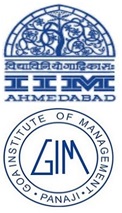CHAPTER WISE SUMMARY Macroeconomic Policy in India Since the Global Financial Crisis - Trends, Policies and Challenges in Economic Revival Post-COVID
Research & Publication (Trade and Investments)
Foreign Direct Investments from India 1964-1983 (Doctoral Dissertation /Thesis of the Indian Institute of Management, Calcutta)
Foreign direct investments from India, although not exactly a recent phenomenon, has attracted the attention of scholars only in the recent past. Nevertheless a fairly substantial literature has emerged on the phenomenon of foreign direct investments (FDI) from the LDCs. The published literature
Determinants Of The Sources Of FDI Into India
Today, Foreign Direct Investments (FDI) into a large developing economy like India arises from many source countries. The question of country characteristics that drive inward FDI into India is an interesting one. This study carries out an analysis of the inward FDI f
The Way Out Of The Current Macroeconomic Mess: A Note
The current situation of a large Current Account Deficit (CAD), low growth, and plunging rupee is a result of the combination of early withdrawal from the fiscal stimulus and the RBI’s monetary conservatism. There is possibly a way out if credit can be expanded to close the differential bet
Role Of Trade And Macroeconomic Policies In The Performance Of Special Economic Zones (SEZS)
Special economic zones (SEZs), following the enormous success of China, have been widely imitated. But it is to be entirely anticipated that the results would vary greatly. Earlier avatars of SEZs in the form of Foreign Trade Zones (FTZs) and Export Promotion Zones (E
FDI Outflows From India: An Examination Of The Underlying Economics, Policies And Their Impact
This paper discusses the trends in India's outward FDI over the last decade and then attempts to identify the driving factors for the same. The aim is to provide policy makers with insights regarding levers which would help in encouraging FDI outflows and to stimulate
A Study Of The Regional Determinants Of Foreign Direct Investments In India, And The Case Of Gujarat
The paper discusses the determinants of FDI over the regions of a large economy like India, using the framework drawn from the advantage concept of Kindleberger and from location theories rooted in regional science. It specifically uses Stephen Hymer's understanding o
Explaining Foreign Direct Investments In Gujarat: A Study Based On An Opinion Survey Of Persons Involved In The Foreign Direct Investment Process
Gujarat has attracted more foreign direct investment (FDI) than what its GDP size alone would suggest. But relative to its peer states, it has fallen short significantly. The above findings which were made in an earlier study are further confirmed through a survey of
Competition Policy In India: Issues For A Globalising Economy
Competition policy is essential for any economy in transition as it complements other liberalising initiatives. However, the scope, sequencing and timing of competition and other policies have to be determined by each economy according to its own compulsions and needs
Why Not Push for a 9 Per Cent Growth Rate?
One quite indisputable gain of the reform has been the increasing openness of the economy. The rise in the openness ratio began in the mid-1980s and accelerated in the 1990s, following the depreciation of the currency in 1990-91. However, the 1997-98 budget and the cu
Prospects For FDI And Multinational Activity In The 90s
The paper discusses the implications of trends and patterns in foreign direct investment and of policy and structural changes for foreign direct investment in India in the 90s. Though high economic growth in the 1980s combined with the liberal policies towards FDI int
Structural Determinants Of Openness Of Economies: The Conceptual Basis And Cross-Sectional Evidence
This study argues that structural factors–principally population per capita income and population density–can explain a significant proportion of the variation in openness defined as (exports+imports)/gross national production. It also provides a conceptual and theoretical basis for t
Multinational Affiliates In India: Why Are They Different From Indian Firms?
This study is conceived within the 'eclectic' paradigm of Kindleberger, Dunning and others. It shows that transnational affiliates in India may not be intrinsically better performers than indigenous firms, but that their niche is altogether different; which perhaps he
Cost And Time Overruns In Public Sector Projects
Delays and cost overruns in public sector investments can raise the capital-output ratio in the sector and elsewhere, bringing down the efficacy of investments. Yet there are no estimates of the delays and cost overruns, and of their opportunity cost. This study arriv
Foreign Direct Investment From India: Ownership And Control Of 'Joint Ventures' Abroad
The phenomenon of foreign direct investments (FDI) from India is substantial and systematic enough to warrant attention. In this empirical study; the pattern and nature of control exercised by the Indian parents, local parties, and possible transnational capital and l
Trends in Foreign Direct Investment from India (1950-1982) Part 2
Foreign direct investment from India is not a marginal phenomenon. It is quite sizeable relative to foreign direct investment into India and private corporate investment in India. It is also quite comparable with the magnitudes of foreign direct investment of the newl
Trends In Foreign Direct Investment From India (1950-1982) Part 1
Foreign direct investment from India is not a marginal phenomenon. It is quite sizeable relative to foreign direct investment into India and private corporate investment in India. It is also quite comparable with the magnitudes of foreign direct investment of the newly industrialising countries a
Blog (Trade and Investments)
Comment on the Trade Policy
The announcements made by the Minister are most disappointing. When world trade demand has shrunk by over 9%, a restatement of developmental efforts that have been going on, very marginal and routine things like promise to reduce transactions costs were the only elements. There is no
SEZs Will Not Hurt Farmers
A harried commerce minister wrongly responded to the concerns of farmers by stating that the current SEZ initiative could hurt those who are giving up their land. The SEZ initiative is certainly not the first best option to promote exports of manufactured goods from I
Unlock SMEs To Tap Full Export Potential
SMEs are the backbone of exports from India, especially of manufactures and increasingly of services if the source of value addition is taken into account. Indeed manufacturing in the ‘original sense’ is very much an SME business. The reasons are not far t
Ignoring The Demand Side In Agriculture
Agricultural reform is not merely the opening up of the economy to imports and liberalising trade in general. Unfortunately, on the ill-advise of organisations like World Bank, we are hell bent on going the wrong way. The error is very much in the strategy. The receiv
Soft-Peddle Agriculture In WTO Talks
In policy circles, there is unanimity that with Europe and the advanced countries moving to less support for agriculture, India, as a developing country, would stand to gain. Unfortunately, the matter is not so self-evident. India’s comparative ad
Infrastructure Spending And Forex
Foreign exchange reserves are not like a bank balance which can be converted entirely into cash for spending. The issue of government expenditure for infrastructural investment has little directly to do with using or not using these. It has to do more with the e
Stemming The Hollowing Out Of Manufacturing
Monetary targeting, which is the RBI’s way, is quite unsuitable in today’s environment of vastly asymmetric growth and capital flows. The belief that money supply determines the inflation rate was never quite true in the linear fashion that seems to
Putting Forex Reserves To Good Use
Government spending cannot directly affect the level of reserves, unless the Reserve Bank of India adopts a policy of killing exports and inflows by allowing the rupee to appreciate and imports to flood the market. Even that would take time to work on the reserv


